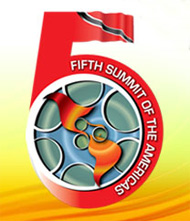By David Heller (Posted: March 11, 2009)
The efforts of more than a hundred civil society organizations – including members of the TAI network – representing some thirty different countries in the Americas, have earned access principles a place on the agenda of this April’s fifth Summit of the Americas meeting in Trinidad and Tobago. But civil society’s intended role of influencing government officials there has been challenging, as the participation process has not been clear, and transparent and revised documents have not been released.
Civil society has met four times since October to draft a series of recommendations that will be presented to the more than thirty heads of state in Trinidad. Linda Shaffer, Project Manager for TAI Global Secretariat, has been involved with this process, and advocated for an explicit reference to the access principles in the recommendations.
Because of her and other TAI partners’ work, heads of state will have the opportunity to put words into action with respect to the access principles. In their current draft, the relevant sections of the recommendations read:
Paragraph 44 of the Declaration of the Port of Spain
We call upon governments to establish binding guidelines. We ask each country to prepare a report by 2010 that identifies specifically the steps the governments have taken to address issues of access to information. We call upon countries to accede to the Convention on Access to Information, Public Participation in Decision-making and Access to Justice in Environmental Matters (Aarhus Convention).
We will also work towards promoting sound environmental governance by strengthening national environmental laws and building institutional capacity for the democratic management of natural resources, guaranteeing citizens access to environmental information, to participation in decision-making processes, and to mechanisms for environmental justice. In addition, the governments commit to developing a system of environmental indicators geared toward monitoring environmental information and justice, in coordination with civil society.
Importantly, the presidents and prime ministers – if they choose to approve these recommendations – will take action to seek entry into the Aarhus Convention, which would be an incredible development for TAI and the global promotion of access principles.
But originally, civil society was not so bold in its call for governments to protect the access principles.
It was not until civil society’s second preparatory meeting, in El Salvador, that the term “principle 10” was inserted in the recommendations. Then a few months later, in Lima, the access principles were explicitly referred to, but still there was no mention of Aarhus, a global manifestation of Principle 10.
Shaffer said that in the final and most recent civil society meeting in DC, she was given the opportunity to press for stronger language. Reactions were supportive, however she had to disabuse many members of the notion that Aarhus was strictly a European affair.
TAI’s success in including this ambitious language in the recommendations is more impressive considering that civil society was faced with far from perfect support from the Organization of American States, convener of the Summit of the Americas.
To begin, the latest drafts of the document (called “Draft Declaration of Commitment” and available here) that civil society was actually recommending alterations to, were not distributed to them for comment. Instead, they had to work off of copies made last July, before alterations were made.
In order for civil society’s oversight role to be effectively exercised, they need to be presented with the most up to date information about the documents they are intending to alter.
Additionally, there was concern among civil society members about the lack of information they’d received about the civil society forum to be convened at a separate site in Trinidad alongside the Summit. It’s during this forum that civil society will have prolonged and direct access to the heads of state, and also when the recommendations will be presented to these leaders.
More information about their role in Trinidad must be offered to civil society. This will enable organizations to effectively prepare for leveraging their influence and pressuring heads of state into approving the recommendations.
This neglect of civil society is especially troubling given the commitment the Summit of the Americas says it has to including this important sector in its affairs. According to its website,
the Summit of the Americas process is structured to consider ideas and proposals from civil society organisations and the private sector as well. In the days leading up to the main event, representatives of these groups will meet to debate the issues and offer their own perspectives on the challenges facing the region.
Let’s hope that the more than 30 heads of state present during the Summit will do more than “consider” the recommendations presented to them. Despite setbacks, civil society has drafted an ambitious set of recommendations, including membership into Aarhus, that the heads of state ought to act on.
See also: The Access Initiative in the V Summit of the Americas
